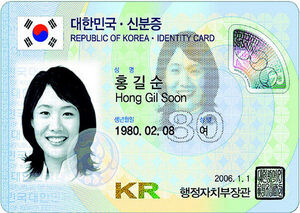hankyoreh
Links to other country sites 다른 나라 사이트 링크
New gov’t ID cards to store data electronically

In the near future, South Koreans will likely hold so-called "next-generation" identification cards, which will store personal data electronically.
According to a statement made by the Ministry of Government Administration and Home Affairs on September 22, the ministry requested a consortium of the Korea Minting and Security Printing Corporation (KOMSC) participated in by Samsung SDS to design new identification cards. The planned integrated-circuit-based "smart card" appeared to be relatively safer than the current cards for protecting personal information and preventing forgery and alteration, the ministry said. The smart card got the most favorable comments in terms of convenience and practicality, added the ministry.
The surface of the cards will include the owner’s name, date of birth, gender, and a passport photo, while personal information such as resident registration number, fingerprints, home address, and security passwords will be contained in the integrated circuit (IC) chip, according to the report.
In addition, the government has suggested that a new "registration number" be built into the card for online identificatory purposes, a number that would be different from users’ resident registration numbers. Currently, online users must enter their resident numbers to identify themselves when using many web sites and when making online financial transactions.
With their improved functions, the new cards could open new administrative opportunities, such as allowing people to use their cards to log onto online government sites or using them for electronic voting, ministry officials said. The report suggested a plan to replace half of South Korea’s ID cards between 2009 and 2011, with development and testing planned through next year.
Gwon Hyeok-in, a ministry official, said, "Based on the report, the ministry will prepare a basic game plan and have consultations with other concerned ministries. We are also going to collect opinions of citizens from every walk of life."
Many civic organizations, however, raised objections, saying that the new cards may infringe upon human rights by consolidating personal information, such as identification, driver’s license, and medical ID numbers.
Kim Yeong-hong, director of the Citizens’ Action Network, said, "The government says it will minimize the personal information to be contained in the card," but because of the diversity of information to be stored, identity theft would be a major concern, he warned. "The government should reconsider its plan to replace the ID cards."
Editorial・opinion
![[Column] Season 2 of special prosecutor probe may be coming to Korea soon [Column] Season 2 of special prosecutor probe may be coming to Korea soon](https://flexible.img.hani.co.kr/flexible/normal/500/300/imgdb/original/2024/0426/3317141030699447.jpg) [Column] Season 2 of special prosecutor probe may be coming to Korea soon
[Column] Season 2 of special prosecutor probe may be coming to Korea soon![[Column] Park Geun-hye déjà vu in Yoon Suk-yeol [Column] Park Geun-hye déjà vu in Yoon Suk-yeol](https://flexible.img.hani.co.kr/flexible/normal/500/300/imgdb/original/2024/0424/651713945113788.jpg) [Column] Park Geun-hye déjà vu in Yoon Suk-yeol
[Column] Park Geun-hye déjà vu in Yoon Suk-yeol- [Editorial] New weight of N. Korea’s nuclear threats makes dialogue all the more urgent
- [Guest essay] The real reason Korea’s new right wants to dub Rhee a founding father
- [Column] ‘Choson’: Is it time we start referring to N. Korea in its own terms?
- [Editorial] Japan’s rewriting of history with Korea has gone too far
- [Column] The president’s questionable capacity for dialogue
- [Column] Are chaebol firms just pizza pies for families to divvy up as they please?
- [Column] Has Korea, too, crossed the Rubicon on China?
- [Correspondent’s column] In Japan’s alliance with US, echoes of its past alliances with UK
Most viewed articles
- 1‘We must say no’: Seoul defense chief on Korean, USFK involvement in hypothetical Taiwan crisis
- 2Is Japan about to snatch control of Line messenger from Korea’s Naver?
- 3No good, very bad game for Korea puts it out of Olympics for first time since 1988
- 4Samsung subcontractor worker commits suicide from work stress
- 5[Editorial] Korea’s surprise Q1 growth requires objective assessment, not blind fanfare
- 6Division commander ordered troops to enter raging flood waters before Marine died, survivor says
- 7N. Korean delegation’s trip to Iran shows how Pyongyang is leveraging ties with Moscow
- 8Korea’s 1.3% growth in Q1 signals ‘textbook’ return to growth, says government
- 9Flying “new right” flag, Korea’s Yoon Suk-yeol charges toward ideological rule
- 10[Column] Park Geun-hye déjà vu in Yoon Suk-yeol